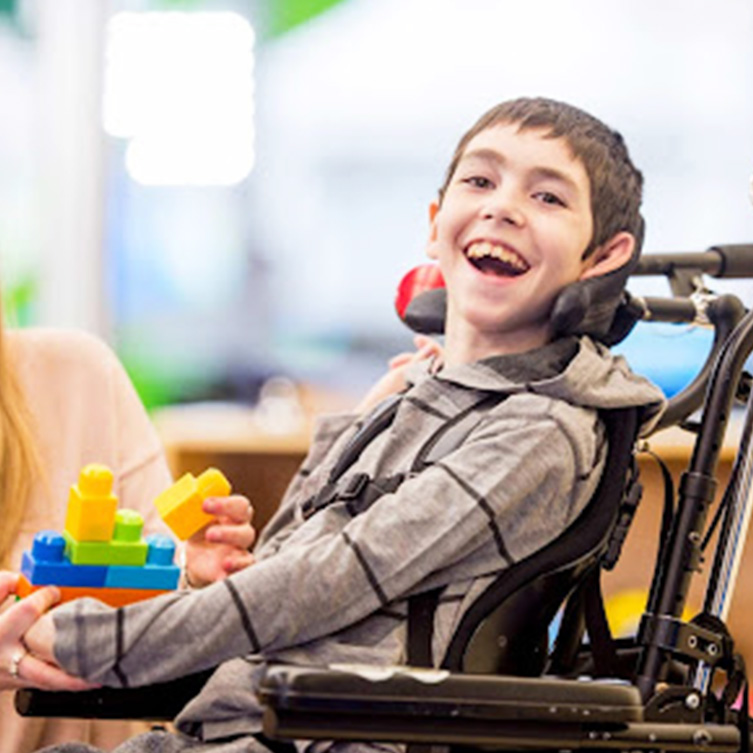Mobility Solutions for Patients with Cerebral Palsy in Houston
Cerebral Palsy is a group of disorders that affect movement and muscle tone. It’s caused by damage that occurs to the developing brain, most often before birth. Contact us for more information

Helpful Products
Signs and symptoms of Cerebral Palsy can be detected during pregnancy or early childhood years. Overall, cerebral palsy causes impaired movement associated with exaggerated reflexes, floppiness or spasticity of the limbs and torso. Strange posture, involuntary movements, and unsteady walking are all signs as well.
Patients dealing with cerebral palsy can have trouble swallowing and may have an imbalance in their eye muscles. This can result in the eyes not being able to focus on the same object. Patients may also experience a reduced range of motion in various joints in their bodies due to muscle stiffness.
What causes Cerebral Palsy and its effect on a patient’s functionality vary greatly. Some can walk and others need assistance. Some patients can experience intellectual disabilities while others do not. Epilepsy, blindness and deafness can also be present. Cerebral Palsy is a lifelong disorder and there is no cure.
LiveWell has a wide range of mobility products that can support independent living for patients with Cerebral Palsy and support their caretakers.
LiveWell Products that can assist with Activities of Daily Living:
Bathroom remodeling to include a zero-entry shower, grab bars, and wheelchair accessible vanities
- Almost all caregivers taking care of someone with Cerebral Palsy realize quickly that they will need to make modifications to their home for safety and accessibility purposes. Modifications to the bathroom will be important to both the patient and the caregivers. Installing a raised toilet seat with arms can make the transfer to the toilet easier. A zero-entry shower that has no threshold is very helpful because it removes any tripping hazards. Wheelchairs can also be rolled into the shower allowing for a shorter distance of transferring the patient. Wheelchair accessible vanities can be installed that allow for the wheelchair to roll underneath and the patient is able to safely use the sink without leaving their chair.
Patient Lifts
Depending on the severity of Cerebral Palsy, patients may struggle to move themselves in and out of bed without assistance. This also becomes an issue as they work to move themselves around the bathroom. LiveWell provides several variations of floor lifts, or Hoyer Lifts, and overhead ceiling track lifts. It’s important to be thinking of all the various locations throughout the home that the patient will need access to.
Most commonly, ceiling lifts allow caregivers to transfer the patient from the bed to a wheelchair. A Hoyer lift can be used to transfer someone from a wheelchair to a shower chair for bathing. Ceiling tracks can be designed to move the patient from room to room; for example, moving the patient from the bedroom to the shower.
Grab Bars
- Patients can begin to experience muscle weakness even in the early stages of ALS. Grab bars are critical in the early stages of the disease with the patient still have the ability to walk. Grab bars help to sustain balance and prevent falls and injuries and should be installed in the shower and beside toilets. Standing grab bars are a great solution beside beds and when there are glass shower doors and no good location for mounting a traditional grab bar.
Stairlifts
- Some Cerebral Palsy patients still have the ability to walk but may require assistive devices to do so. Oftentimes, certain areas of the home become off limits because they simply aren’t accessible. Navigating the stairs and maintaining accessibility to all rooms of the home does not have to be a difficult process. Adding a stairlift to the home removes any mobility barriers for a patient living with Cerebral Palsy that is still able to walk on their own. The stairlift moves on a track up and down the stairs. The seat has a seatbelt and is controlled by a device on the arm rest.
In-home elevator
- When a patient with Cerebral Palsy is unable to walk on their own or requires constant use of a power chair, it may be time to consider adding an in-home elevator. There are several types of elevators that can be used. Standard residential elevators require a pit and an elevator shaft. LiveWell’s innovative through-the-floor home lifts require no elevator shaft and can be freestanding. An inclined or vertical platform lift is perfect for accessibility for wheelchair users. Vertical platform lifts can be used indoor or outdoor and have an open platform. They take up less space than a ramp.
Doorway Widening
- A lot of times, people never stop to consider their doorways when they are considering making accessibility modifications. It is so important to consider the size of the patient’s assistive devices when thinking about expanding the doorways in the home. The standard size of an interior door ranges from 22 to 30 inches. The minimum recommended door width for those with assistive equipment that will need to pass through it is 36 inches.
Ramps
- If the patient has a difficult time walking or is confined to a wheelchair, entering and exiting may become a problem if there are stairs or uneven, rough terrain. A ramp can remove any barriers to entry and provide a safer way to enter and exit. Ramps come in all shapes and sizes and are custom fitted to the home. They can be made out of wood or metal, depending on the patient’s needs.
Power Scooters or Chairs
- Leading an active, normal life is of the utmost importance for patients with Cerebral Palsy, and power scooters can help them do just that in a safe and stress-free way. Power scooters are battery powered mobility devices that allow patients to travel to places without having to walk or, if close by, drive. Vehicle lifts or hitch-mounted lifts can be used to transport the power scooter or chair wherever needed.
- There are a variety of power scooters available and the type needed is based on various factors: where and how patients plan on using their scooter, specific mobility needs, and budget.
While there is no cure for Cerebral Palsy, LiveWell and our wide variety of products can help to ensure that mobility isn’t an issue. Our products and services can make any room in the home safer and more accessible for those that are battling Cerebral Palsy. Contact us today to schedule a free in-home consultation. Our team of experts can evaluate the home and provide a thorough proposal of all available options. Call us at (281) 771-1469 for more information.


